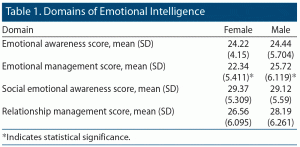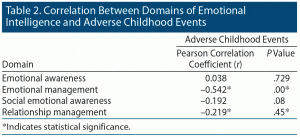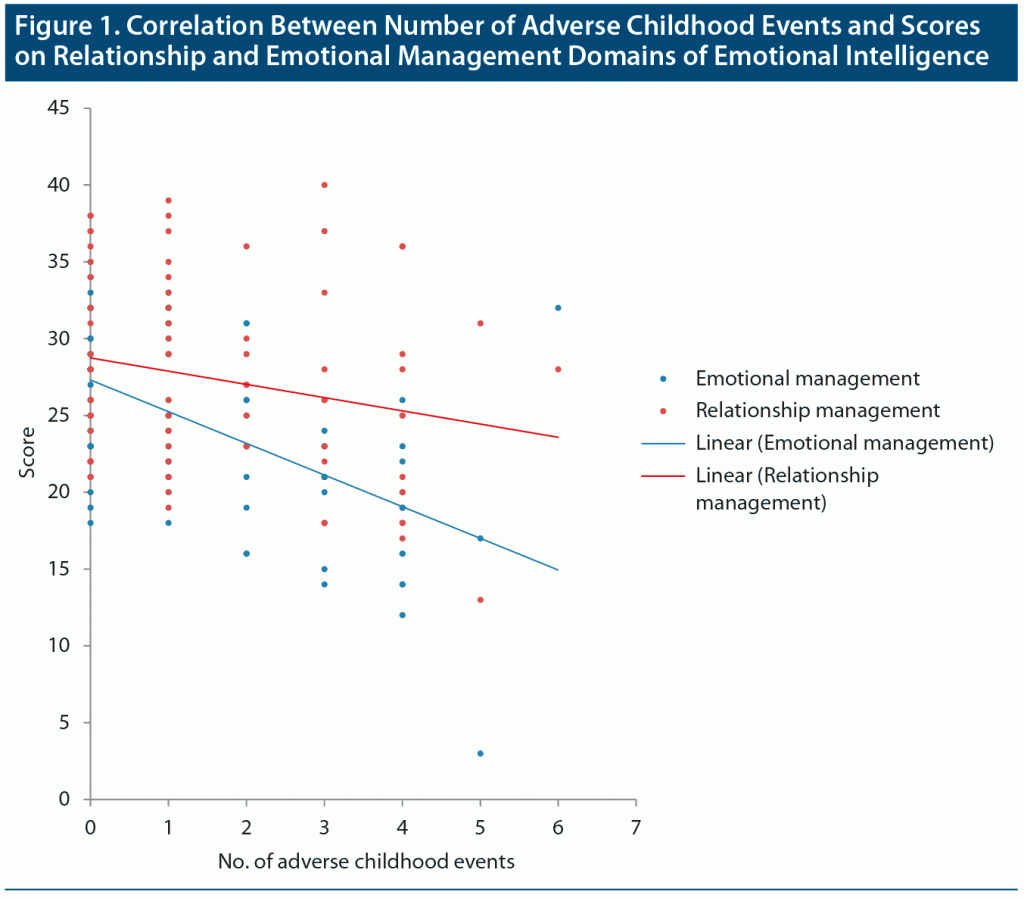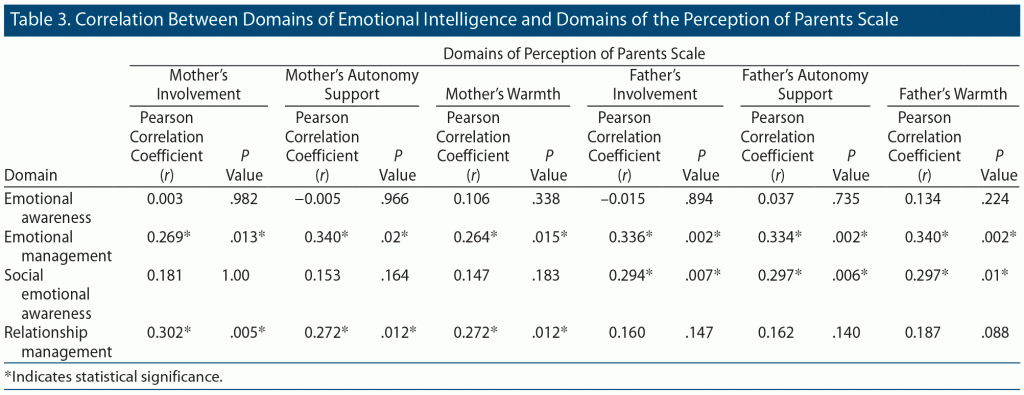ABSTRACT
Objective: Emotional intelligence describes how well an individual understands and manages his or her emotions. Parenting styles and early life events have an important bearing on emotional intelligence. The objective of this study was to assess the impact of adverse childhood events and perception toward parents on the various domains of emotional intelligence among medical interns.
Methods: This cross-sectional observational study was conducted among medical interns in an eastern Indian teaching hospital from August 2020 to September 2020. Emotional intelligence was assessed using the Quick Emotional Intelligence Self-Assessment in terms of emotional awareness, emotional management, social emotional management, and relationship management. Adverse childhood experiences were assessed using the Adverse Childhood Experiences Questionnaire. Perception toward parents for all participants was assessed using the Perceptions of Parents Scale, which measured their mother’s involvement, autonomy and support, and warmth and their father’s involvement, autonomy and support, and warmth.
Results: Of the 84 participants, 66.66% (n = 56) reported at least 1 adverse childhood experience. There was a significant negative correlation of adverse childhood experiences with emotional management (r = –0.542, n = 84, P = .00) and relationship management (r = –0.219, n = 84, P = .45). Emotional management showed a positive correlation with mother’s involvement (r = 0.269, P = .013), autonomy and support (r = 0.34, P = .02), and warmth (r = 0.264, P = .015) and father’s involvement (r = 0.336, P = .002), autonomy and support (r = 0.334, P = .002), and warmth (r = 0.340, P = .002). Relationship management showed a positive correlation with mother’s involvement (r = 0.302, P = .005), autonomy and support (r = 0.272, P = .012), and warmth (r = 0.272, P = .012). Social emotional management showed a positive correlation with father’s involvement (r = 0.294, P = .007), autonomy and support (r = 0.297, P = .006), and warmth (r = 0.297, P = .01).
Conclusion: Experiencing adverse childhood events lowers emotional intelligence. Higher parental involvement, warmth, and autonomy and support promote better social emotional awareness, as well as emotional and relationship management.
Prim Care Companion CNS Disord 2021;23(5):20m02861
To cite: Priyam P, Nath S. A cross-sectional study on the effect of adverse childhood events and perception toward parents on emotional intelligence. Prim Care Companion CNS Disord. 2021;23(5):20m02861.
To share: https://doi.org/10.4088/PCC.20m02861
© Copyright 2021 Physicians Postgraduate Press, Inc.
aDepartment of Psychiatry, RG Kar Medical College & Hospital, Kolkata, West Bengal, India
*Corresponding author: Pallavi Priyam, MBBS, Department of Psychiatry, RG Kar Medical College 1, Khudiram Bose Sarani, Kolkata-700004, West Bengal, India ([email protected]).
Challenging the long-persisting belief of the intelligence quotient being a measure of success, emotional intelligence arose as an ability-based concept in the 1990s. As explained by Mayer and colleagues,1 emotional intelligence describes how well an individual understands and manages his or her emotions. It also takes into consideration the ability of being aware of, expressing, and regulating emotions in social contexts.1
Adverse childhood events comprise traumatic events that an individual faces before the age of 18 years. These events are inclusive of all forms of abuse, parental neglect, substance use, mental illness in the family, separation between parents, domestic violence, and incarceration. Research has shown that exposure to adverse childhood events results in heightened emotional reactivity, poor emotional awareness, and habitual use of maladaptive emotion-regulation strategies, consequently leading to internalizing problems later in life.2,3 Distinct threats faced in childhood may have implications on various aspects of emotional intelligence.2,3
Parents are an important part of a child’s life, and their contribution to the development of an individual cannot be neglected. The perception toward parents by an individual provides their perspective about the role parents have assumed in their lives. It is well established that parental practices have a bearing on the way one manages emotions in personal and social spheres.4
Emotional competence is a necessity for an individual to be able to deal with change effectively. Turmoil and pressure are handled better by those who are capable of understanding their emotions and responding to the transitions in their lives in a healthy way. The effects of poorly regulated emotions are associated with depression, borderline personality disorder, substance use disorders, eating disorders, somatoform disorders, and a variety of other psychopathologic symptoms.5,6
Indian literature on similar aspects of emotional intelligence is lacking. Therefore, this study aimed to assess the impact of adverse childhood events and perception toward parents on emotional intelligence in the Indian population. Specifically, the objectives were to assess the association between adverse childhood events and emotional intelligence and the association between perception toward parents and emotional intelligence.
METHODS
Study Overview and Design
After approval from the institutional ethics committee, the study was conducted from August 2020 to September 2020. Of 200 medical interns, 93 individuals who met the inclusion and exclusion criteria were approached. The inclusion criterion was having both parents alive. Exclusion criteria were refusal of consent and having lost 1 or both parents. An anonymous form consisting of the tools listed below and sociodemographic details (age and sex) was handed out to the participants. Since 9 participants returned incomplete forms, the final sample size was 84.
Assessment Tools
Adverse Childhood Experiences Questionnaire (ACE Questionnaire). A self-rated 10-item scale with yes/no responses that assesses the number of adverse childhood events faced by an individual aged < 18 years. Each response answered as “yes” is scored as 1, whereas “no” responses are scored as zero. The total ACE Questionnaire score is a summation of all individual responses.7
Perceptions of Parents Scale. A self-rated scale consisting of a total of 42 questions assessing an individual’s perception toward their parents. Maternal and paternal involvement, autonomy and support, and warmth are measured on a Likert response scale (scores 1 through 7).8
The Quick Emotional Intelligence Self-Assessment. A self-rated measure of emotional intelligence. A total of 40 items are used for assessment of emotional intelligence in terms of emotional awareness, emotional management, social emotional management, and relationship management.9
Statistical Analyses
The data were tabulated in Microsoft Excel and then analyzed using statistical package for SPSS version 16.0 (SPSS Inc, Chicago, Illinois). Sociodemographic details, frequencies of adverse childhood events, and mean scores on various domains of emotional intelligence were computed by descriptive analysis. Cross-tabulation and χ-square test were used to assess the difference between adverse childhood events among male and female participants. An independent t test was done to assess if the male and female participants differed statistically on various domains of emotional intelligence and perception toward parents. A Pearson product-moment correlation coefficient was computed to assess the association between adverse childhood events and domains of emotional intelligence. The same was used to assess the association between the domains of the Perceptions of Parents Scale and emotional intelligence. The strength of association was determined by Pearson product-moment correlation coefficient.10
RESULTS
A total of 84 participants who met the exclusion and inclusion criteria completed the questionnaires. There were 48.8% (n = 41) female and 52.2% (n = 43) male participants. The mean age of the participants was 24.27 years (SD = 1.293 years).
Emotional intelligence between males and females was compared using an independent t test. Male participants scored significantly higher on the emotional management domain of emotional intelligence than did their female counterparts (t = −2.676, P = .009). Scores on other domains were comparable (Table 1).
Participants reported a mean ACE Questionnaire score of 1.57 (SD = 1.57). Two-thirds (n = 56, 66.66%) of the participants reported at least 1 adverse childhood event. More males (n = 29, 57.78%) than females (n = 27, 48.21%) had experienced adverse childhood events, but the difference was not statistically significant (P = .877). There was a significant negative correlation of adverse childhood events with emotional management (r = –0.542, n = 84, P = .00) and relationship management (r = –0.219, n = 84, P = .45). The association for emotional management was moderately negative but negligible for relationship management (Table 2 and Figure 1).
As analyzed by an independent t test, there was no statistically significant difference between domain scores reported by male and female participants in perception toward parents. Emotional management showed a low positive correlation with maternal autonomy and support and a negligible positive correlation with maternal involvement and warmth. Relationship management showed a low positive correlation with maternal involvement and a negligible correlation with maternal autonomy and support and warmth. Emotional management showed a low positive correlation with father’s involvement, autonomy and support, and warmth. Social emotional management showed a positive correlation with father’s involvement, autonomy and support, and warmth, but strength of the association was close to negligible (Table 3).
DISCUSSION
The purpose of this study was to assess the association of adverse childhood events and perception toward parents with emotional intelligence. Early environment is known to shape a person’s emotional responses in life, and early childhood experiences and parenting style are important factors impacting an individual.
The main finding of our study includes a moderately negative impact of adverse childhood events on emotional management. Also important is a positive correlation of perception toward parents with emotional management, relationship management, and social emotional awareness. Warmth, autonomy and support, and involvement of both parents contributed to better emotional management among the study participants. Relationship management was better among those who perceived higher maternal involvement. Paternal involvement, autonomy and support, and warmth contributed to better social emotional awareness. Additionally, we found that scores on emotional intelligence were comparable between men and women for all domains except emotional management, which were better for men compared to women.
The novel finding in our study was that there was no significant difference in the way men and women perceived their parents in terms of warmth, autonomy and support, and involvement. Also contradictory to existing literature, male and female participants did not differ statistically in terms of exposure to number of adverse childhood events.
A longitudinal study11 showed that those who were exposed to adversities in childhood had difficulties at various levels of emotional processing and showed heightened reactivity and greater expressive suppression and rumination. Early maltreatment leading to a highly stressful environment compels an individual to develop patterns of behavior that promote vigilance and self-preservation at the cost of developing better adaptive functions.12 Emotional dysregulation resulting from adverse childhood events renders an individual vulnerable to impulsivity or behavioral inhibitions.13 Similarly, our study reports a negative impact of early adverse events on emotional intelligence of an individual, notably in the domain of emotional management.
Parental communication plays an important role in determining a child’s emotional intelligence. Those treated violently by their parents resort to an offensive or avoidant manner of communication. They have low positive emotional communication and emotional repair.14 Parental support promotes better social initiatives, whereas greater parental control leads to emotional problems and antisocial behavior.15 Our study further supports these findings. Our results, however, contradict the findings of a study16 from Tehran, which showed all dimensions of emotional intelligence to be related with perceived parenting.
As a whole, it is believed that sex does not affect emotional intelligence; however, the difference may be visible when various domains are considered separately. Females are considered better at feeling and understanding their emotions, whereas males are considered better at regulation of emotions and withstanding pressure.17–19 The results of the current study are consistent with males being better at controlling their impulses.
Several studies20,21 report parents to be more focused on dominance, power, and negativity with boys, while they show more warmth, affiliation, and closeness to girls. This finding is suggestive of parents using controlling strategies with boys and autonomy-supportive strategies with girls.20,21 A meta-analysis22 reported sex differences between perceptions toward parents to be at a minimal level.22 Our study thus highlights a change in the trend of parenting styles. Such a finding may be a result of changing cultural mores and acceptance of the female child as at par with the male child.
Exposure to adverse childhood events has been reported to have variable association with sex. Some studies report adverse childhood events to be more common among females.23 However, a large study24 carried out in southern India reported adverse childhood events to be both more frequent and more severe among males. However, our finding that both sexes are equally predisposed to experiencing early adverse events in life contradicts the popular myth that girls are more prone to abuse.
The strength of our study is that the study population was nearly homogeneous in sex composition and thus gives a good representation of the variables across the 2 sexes. Further evaluation of interpersonal relationships and psychiatric morbidities among those who scored low on emotional intelligence would have added a new dimension to this study.
CONCLUSION
This study underscores that childhood experiences and parenting play an important role in the development of emotional intelligence. Those who experience adverse events during childhood face difficulties in the management of emotions. Children who grow up with involved, warm, and supportive parents have a higher emotional intelligence.
Clinical Points
- Emotional intelligence is a valuable ability to combat everyday stress.
- Early life events and perception toward parents play an important role in development of the emotional quotient.
- Early intervention in cases of adverse childhood events and encouragement of positive parenting can aid in the development of emotionally intelligent individuals better able to adapt to stressors, eventually curtailing psychological problems and contributing to better mental health.
Submitted: November 6, 2020; accepted February 3, 2021.
Published online: October 14, 2021.
Potential conflicts of interest: None.
Funding/support: None.
References (24)

- Mayer JD, Salovey P, Caruso DR. Emotional intelligence: new ability or eclectic traits? Am Psychol. 2008;63(6):503–507. PubMed
- McLaughlin KA, Green JG, Gruber MJ, et al. Childhood adversities and adult psychopathology in the National Comorbidity Survey Replication (NCS-R) III: associations with functional impairment related to DSM-IV Psychol Med. 2010;40(5):847–859. PubMed CrossRef
- Lambert HK, King KM, Monahan KC, et al. Differential associations of threat and deprivation with emotion regulation and cognitive control in adolescence. Dev Psychopathol. 2017;29(3):929–940. PubMed CrossRef
- Martinez-Pons M. Parental inducement of emotional intelligence. Imagin Cogn Pers. 1998;18(1):3–23. CrossRef
- Irvin JL, Richardson TL. The importance of emotional intelligence during transition into middle school. Middle Sch J. 2002;33(3):55–58. CrossRef
- Berking M, Wupperman P. Emotion regulation and mental health: recent findings, current challenges, and future directions. Curr Opin Psychiatry. 2012;25(2):128–134. PubMed CrossRef
- Felitti VJ, Anda RF, Nordenberg D, et al. Relationship of childhood abuse and household dysfunction to many of the leading causes of death in adults. The Adverse Childhood Experiences (ACE) Study. Am J Prev Med. 1998;14(4):245–258. PubMed CrossRef
- Robbins RJ. An assessment of perceptions of parental autonomy support and control: child and parent correlates. Unpublished Doctoral Dissertation, Department of Psychology, University of Rochester: Rochester, NY;1994.
- Neotecouncil.org. The Quick Emotional Intelligence Self-Assessment. Accessed August 26, 2021. https://neotecouncil.org/wp-content/uploads/2012/04/EmotionalIntelligence-Self-Assessment.pdf
- Schober P, Boer C, Schwarte LA. Correlation coefficients: appropriate use and interpretation. Anesth Analg. 2018;126(5):1763–1768. PubMed CrossRef
- Weissman DG, Bitran D, Miller AB, et al. Difficulties with emotion regulation as a transdiagnostic mechanism linking child maltreatment with the emergence of psychopathology. Dev Psychopathol. 2019;31(3):899–915. PubMed CrossRef
- Frankenhuis WE, Del Giudice M. When do adaptive developmental mechanisms yield maladaptive outcomes? Dev Psychol. 2012;48(3):628–642. PubMed CrossRef
- Beauchaine TP. Part 6: child and adolescent psychopathology predictors and processes: future directions in emotion dysregulation and youth psychopathology. In: Prinstein MJ, ed. Future Work in Clinical Child and Adolescent Psychology. Abingdon, Oxfordshire: Routledge;2018:311–332.
- López-Martínez P, Montero-Montero D, Moreno-Ruiz D, et al. The role of parental communication and emotional intelligence in child-to-parent violence. Behav Sci (Basel). 2019;9(12):148. PubMed CrossRef
- Barber BK, Stolz HE, Olsen JA. Parental support, psychological control, and behavioral control: assessing relevance across time, culture, and method. Monogr Soc Res Child Dev. 2005;70(4):1–137. PubMed
- Asghari MS, Besharat MA. The relation of perceived parenting with emotional intelligence. Procedia Soc Behav Sci. 2011;30:231–235. CrossRef
- Bar-On R, Parker JDA, Bar-On R. The Handbook of Emotional Intelligence: Theory, Development, Assessment, and Application at Home, School, and in the Workplace. San Francisco, CA: Jossey-Bass; 2000:363–388.
- Bindu P, Thomas I. Gender differences in emotional intelligence. Psychol Stud (Mysore). 2006;51:261–268.
- Sanchez-Nunez MT, Fernández-Berrocal P, Montanes J, et al. Does emotional intelligence depend on gender? the socialization of emotional intelligence in males and females and its implications. Electron J Res Educ Psychol. 2008;6(2):455–474.
- Tamis-Lemonda CS, Briggs RD, McClowry SG, et al. Maternal control and sensitivity, child gender, and maternal education in relation to children’s behavioral outcomes in African American families. J Appl Dev Psychol. 2009;30(3):321–331. PubMed CrossRef
- Mandara J, Murray CB, Telesford JM, et al. Observed gender differences in African American mother-child relationships and child behavior. Fam Relat. 2012;61(1):129–141. CrossRef
- Endendijk JJ, Groeneveld MG, Bakermans-Kranenburg MJ, et al. Gender-differentiated parenting revisited: meta-analysis reveals very few differences in parental control of boys and girls. PLoS One. 2016;11(7):e0159193. PubMed CrossRef
- Saha R, Giressan A, Deb S. Impact of adverse childhood experiences on mental health: a retrospective study. Indian J Positive Psychol. 2014;5(2):183–186.
- Damodaran DK, VargheseP. The unveiled Indian picture of adverse childhood experiences: socio-demographic correlates among youth in Kerala. IAHRW Int J Soc Sci Rev. 2018;6(7):1248–1257.
Enjoy this premium PDF as part of your membership benefits!









